
NUKU
By Qiane Matata-Sipu

NUKUSep 22, 2020

NUKU Tōku Reo // WHA

NUKU Tōku Reo // TORU

NUKU Tōku Reo // RUA
In episode two we speak to filmmaker Chelsea Winstanley and Journalist Leonie Hayden about language learning feeling like we're all in kohanga reo, and how that realisation creates safe to fail spaces in the language reclamation journey. We discuss the good and bad of te reo Māori in the film and media industries and chat about the responsibility of language learners and speakers. We share our favourite kupu and the deep meanings behind them and, give you lots of learning tips regardless of where you are on your journey.
Following on from the acclaimed NUKU podcast and book that showcased 100 kickass Indigenous women doing things differently, our new series Tōku Reo is focussed on language. Across 10 special episodes we will be sharing the language reclamation journeys of Indigenous women, including our host Qiane Matata-Sipu who has returned to kura in 2022 studying Rumaki Reo at Te Wananga Takiura o ngā Kura Kaupapa Māori o Aotearoa.
To watch the video version of this podcast visit: https://youtu.be/n8T4fBSWrNk
To buy the book, NUKU: Stories of 100 Indigenous Women visit: www.nukuwomen.co.nz/shop
For more about NUKU visit www.nukuwomen.co.nz

NUKU Tōku Reo // TAHI
We speak with Māori Midwife Camille Harris and fragrance developer Tiffany Witehira who are both at the beginning of their year-long total immersion Māori language course. The pair share the stories behind their desire to reclaim te reo, share their lived experiences of language being looked down upon as a result of colonisation and, give us an insight into the first month of their study. They also share some study tips and tricks they have picked up along the way.
Following on from the acclaimed NUKU podcast and book that showcased 100 kickass Indigenous women doing things differently, our new series Tōku Reo is focussed on language. Across 10 special episodes we will be sharing the language reclamation journeys of Indigenous women, including our host Qiane Matata-Sipu who has returned to kura in 2022 studying Rumaki Reo at Te Wananga Takiura o ngā Kura Kaupapa Māori o Aotearoa.
To watch the video version of this podcast visit: https://www.youtube.com/watch?v=xCfy1KKLvlA
To buy the book, NUKU: Stories of 100 Indigenous Women, visit www.nukuwomen.co.nz/shop
For more about NUKU visit www.nukuwomen.co.nz
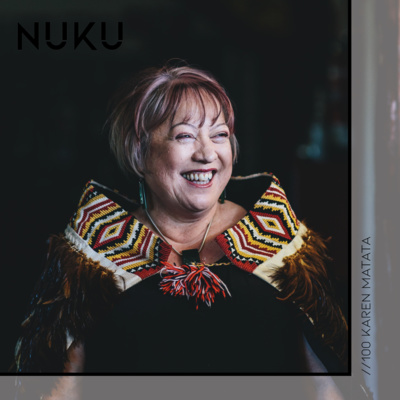
//100 Karen Matata
Kia ora e te whānau. Today is a very special day, we celebrate NUKU //100!
Through this series we have met and interviewed wāhine right across the motu - the matauranga holders, the frontliners, the carers, the whale whisperers, the teachers, the researchers, the ahi kaa, the boundary pushers, the leaders, the workers, the innovators, the motivators, wāhine who are empowering across generations by being unapologetically themselves.
NUKU //100 holds a special place in my heart. It is my honour to introduce you to my māmā, this 100th wāhine is a reminder to us all that we will come across so many inspiring wāhine on our journey, from all over the world in all walks of life, but we must never forget those who make us who we are - our mothers, our grandmothers, our aunties, our sisters, our daughters.
Meet Karen Matata (Te Waiohua, Waikato, Ngāpuhi, Ngāti Pikiao, Arorangi (Rarotonga), Temakatea, Oneroa (Mangaia)
Karen has been an early childhood educator for more than 40 years. She has worked for her marae, Makaurau, as secretary for more than 25 years, and holds governance positions across education and community groups in Tāmaki Makaurau.
In this episode we talk about her Māori girls boarding school experience, she shares her perspective on single motherhood and sharing her eldest daughter with her parents to raise, we discuss the power of education and talk about the reality of working for your people.
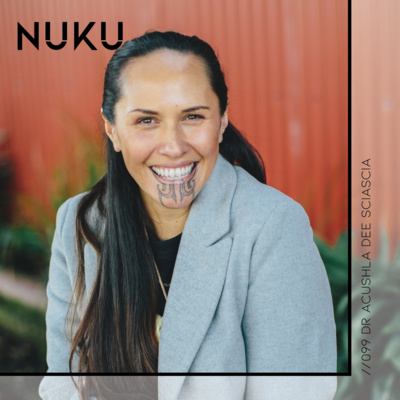
//099 Dr Acushla Dee Sciascia
Meet NUKU //099 Dr Acushla Dee Sciascia (Ngāruahine Rangi, Ngāti Ruanui, Te Ātiawa)
This incredible wahine is a business woman representing Indigenous perspectives and narratives in research, evaluation and strategy development. Her studies found her researching digital tangihanga long before Covid-19 had arrived, exploring how tikanga in te ao Māori is changing with modern times.
In this episode we talk about her mahi and explore the inter-generational kōrero around tikanga, today.

//098 Kurahapainga Te Ua
Kurahapainga (Te Rarawa, Te Aupōuri, Te Aitanga-a-Māhaki, Te Whakatōhea, Ngāi Tūhoe, Te Whānau-ā-Apanui) is the founder and artistic director of Hawaiki TŪ, a Māori performance company specialising in kapa haka and haka theatre. She is also a member of the renowned Te Waka Huia kapa haka roopu.
In this episode NUKU //098 talks to us about the foundation of haka theatre, she shares her experiences growing up as a child of a gang member and tells us about the realities of trialing for one of our country’s top kapa haka groups.
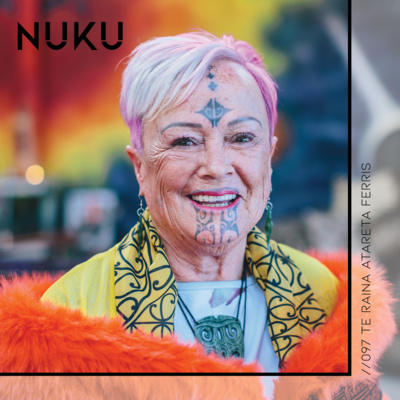
//097 Te Raina Atareta Ferris
Te Raina (Ngāti Kahungunu, Ngāti Raukawa, Ngāti Māmoe, Kāi Tahu, Italy) runs education programmes about Māori culture from her whare wānanga, Kurawaka.
Based in Pōrangahau, she teaches wāhine to find their karanga voice, teaching the foundations of karanga and the mātauranga of mana wāhine, mana atua and mana motuhake.
In this episode we kōrero about kurawaka, kapa haka and karanga, and get completely immersed in the stories of this wonderful whaea.

//095 Geneva Harrison + //096 Mihi Tibble
We have a special double episode for you. NUKU 095 and 096 are Geneva Harrison (Ngāti Kahu, Te Rarawa, Te Aupōuri) and Mihi Tibble (Ngāti Mākino, Ngāti Whakahemo, Ngāti Rangiwewehi, Ngāti Pikiao, Ngāti Whakaue, Whānau a Hinerupe, Rakairoa, Te Whānau a Karuwai, Te Aitanga a Mate).
The friends are the founders of Tuhi Stationery. They create notebooks, diaries, maramataka resources and other stationery products inspired by Māori language, culture, environment and values. They also have a Sāmoan range.
In this episode we talk about the realities of small business. The pair share with us their personal stories of growing up with grandparents who lived according to the maramataka and tell us how they are helping to revive our connection to our lunar calendar system.
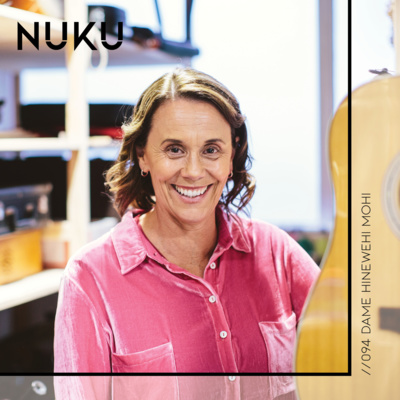
//094 Dame Hinewehi Mohi
Dame Hinewehi Mohi (Ngāti Kahungunu, Ngāi Tūhoe) has been iconic in the development of puoro Māori for the past 30 years.
In 1999, she released her Oceania album and made history singing the national anthem in te reo Māori. Today, she is championing a bilingual music industry for Aotearoa.
In this episode we talk about her passion for te reo Māori, she shares the story of Raukatauri Music Therapy Centres inspired by her daughter, Hineraukatauri. And, she tells us about her dream to see Aotearoa musicians record in both languages.

//093 Yvonne Thomas
Yvonne (Ngāpuhi) is a mentor and trustee with Auckland Teaching Gardens Trust. She supports the community with garden plots, gardening courses and supplying kai to food banks.
We recorded this interview in her garden in Māngere, surrounded by manu and the local community tending to their plots.
In this episode she talks to us about her upbringing and how society has changed over her lifetime. She shares the importance of growing a garden, not only for sustainability and kai purposes, but also for learning some of life’s greatest lessons.

//092 Andria Dafne Pablo Sanchez, Vee'us Xiuh Janiki Yollotlpactli
Xiuh, as she likes to go by is of Mexican heritage (Mestiza, Nahua (Mexico)). For years she has worked to revitalise ancient Indigenous practices. Here in Aotearoa she shares temazcal, kinam and tezcatlipoca practices of old central Mexico. She is also a wisdom keeper of ancient Toltec traditions.
In this episode Xiuh talks to us about the colonisation of Mexico and she shares how connecting with wāhine Māori challenged and inspired her to refocus her mahi on strengthening Indigenous cultural knowledge and practice.

//091 Erin Matariki Carr
Matariki, as she prefers to go by (Ngāti Awa, Ngāi Tūhoe) is the Co-Lead for RIVER (Revitalising Indigenous Values for Earth’s Regeneration) and Co-Manager for the New Zealand Alternative. She is also Project Manager for Te Kaunoti Hikahika (or E Hika!), a constitutional reformation project rolling out across Aotearoa.
Based in Tāneatua this phenomenal wahine spends her time supporting both people, and planet, to thrive.
In this episode we talk about connecting the global Indigenous community, the whakaaro behind constitutional reformation and why each of her sisters carry the name of our most popular star cluster.

//090 Charmeyne Te Nana-Williams
Charmeyne Te Nana-Williams (Ngāpuhi, Ngāti Raukawa, Ngāti Kahungunu ki Wairarapa, Kāi Tahu, Ngāti Toa) is the CEO of What Ever It Takes, an organisation using Māori models of clinical practice for whānau affected by complex disability and trauma, as a result of an acquired serious injury.
She came into this mahi through her own experience in finding support for her husband who, following a boxing injury, became affected by disability and trauma.
In this episode Charmeyne talks to us about that pivotal time in her life, she shares kōrero about working with whānau hauā, and celebrates her twin girls and their sporting success.

//089 Irihapeti Edwards
NUKU 089 is Irihapeti Edwards (Ngāti Manawa, Ngāpuhi, Ngāti Hikairo, Ngāti Awa, Ngāti Whātua ki Kaipara, Te Arawa). This incredible young woman works across financial services and global youth leadership.
Among a number of accolades, she has been a Prime Minister’s Scholar and UN Youth New Zealand delegate.
In this episode she talks about financial literacy and the power it has to transform our communities. She shares her journey into leadership and tells us some of her ambitions in the financial sector.

//088 Tania Page
Tania Page (Ngāti Kahu, Ngāi Tahu) is a journalist currently working with TVNZ’s flagship current affairs show, Sunday.
Earlier in her career, she was on the team that launched the 24 hour news channel Al Jazeera English.
In this episode she shares her career journey, working in news media around the world, and talks to us about some of the heart-wrenching stories she has had to cover in her time as a journalist.

//087 Puawai Cairns
NUKU 087 is Puawai Cairns of Ngāti Ranginui, Ngāi Te Rangi and Ngāti Pūkenga whakapapa. Puawai has held a number of roles across her time at Museum of New Zealand Te Papa Tongarewa, including as curator.
She is currently Te Papa’s Director of Audience and Insight.
In this episode she talks to us about the power of museums and the importance of telling the right stories. She shares some of her favourite exhibitions and how they have impacted both her, and the community she serves, and, she shares her journey as a single māmā and the realities of co-parenting, today.

//086 Julia Arnott-Neenee
Julia Arnott-Neenee (Sāmoan, Chinese, British) is the co-founder and director of PeopleForPeople, a youth-led social enterprise on a mission for digital equity.
She’s also a strategy and insights specialist with a personal goal to change the statistics around the lack of diversity in the information and communications technology sector.
In this episode she tells us about her experience working with industry leaders across the world, the realities of the digital divide and why it was important for her to come home and help create change for her people.
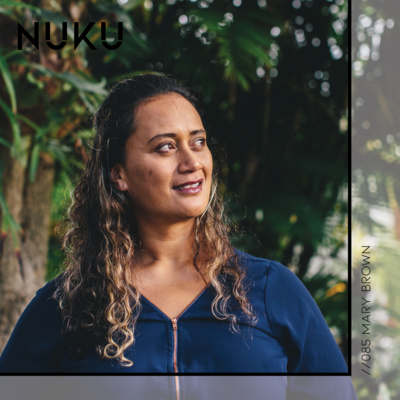
//085 Mary Brown
NUKU 085 is Mary Brown (Ngāti Maru, Ngāti Whātua). Mary is a full-time, stay-at-home māmā of 10 tamariki, all under 15 years old. She is also a champion for financial literacy.
In this episode we talk about motherhood and the stereotypes that come with raising a large family. Mary shares her whakaaro on raising the leaders of tomorrow and she tells us how being a māmā has helped her find herself.

//083 Melony Paikea-Tautalanoa and //084 Manawawharepu Udy
We’ve got a double episode for your today with Melony Paikea-Tautalanoa (Ngāti Whātua, Ngāti Whakaue, Te Arawa) and Manawawharepu Udy (Te Arawa, Mātaatua, Tainui)
Mel and Manawa are the founders of Ngahere Communities, a social enterprise championing the potential of South Auckland entrepreneurs, innovators and creators through collaborative spaces, common values and co-designed responsive programmes.
In this episode we talk about social impact, business growth and the pair share personal stories about their youth.

//082 Phylesha Brown-Acton
NUKU 082 is Phylesha Brown-Acton (Fineone Hakupu, Atua (Niue)
Phylesha serves Pasifika Rainbow, LGBTQIA+, MVPFAFF+ peoples and their families. She is the Executive Director of F’INE Pasifika Aotearoa, co-founded with Mama Tere Tahere-Strickland.
F’INE is part of the Pasifika Whānau Ora Collective and Phylesha’s primary role is to challenge rhetoric and oppressive systems that minimise or have invisibilised her community.
In this episode we talk about Phylesha’s upbringing, we discuss the topic of gender, and she shares the importance of Indigenous terminology when it comes to her community.
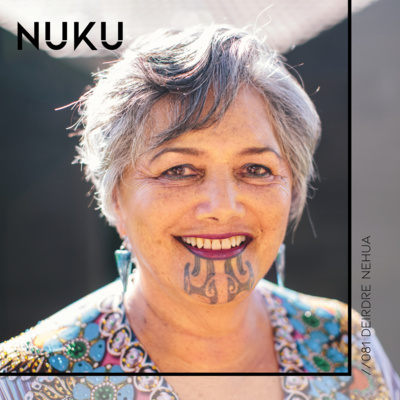
//081 Deirdre Nehua
Deirdre Nehua (Ngātiwai / Ngāti Hao) has spent most of her life working for positive change for ngāi Māori, challenging the racism and inequities thrust upon our communities as a result of colonisation. She is also a writer and poet.
From her involvement in the Maori Land March and land occupations of the 70s, 80s and 90s, to working in prisons, reputedly becoming the first CEO to wear moko kauae and, travelling the world to exchange indigenous knowledge with other first nations people, she has fit a lot of life into her 7 decades.
In this episode we kōrero. About everything. She shares her experiences growing up in whangaruru, to the moment in her life she became most politicised. She shares with us her poetry that she describes as Indigenous erotica, and reminds us that you’re never too old to enjoy sex.

//080 Dr Jenny Lee-Morgan
Dr Jenny Lee-Morgan (Waikato, Ngāti Mahuta, Te Ahiwaru, Chinese) is a teacher, author, researcher, māmā and grandmother with Chinese-Māori whakapapa.
Jenny has worked as a secondary school teacher and in the community, tertiary and business sectors. Today, she is a professor of Māori research and the director of Ngā Wai a te Tūī, Māori and Indigenous Research Centre, Te Whare Wānanga o Wairaki (Unitec).
In this episode she shares her experiences as a Māori-Chinese wahine growing up in Aotearoa.
In this episode she shares her experiences as a Māori-Chinese wahine growing up in Aotearoa. We discuss identity and racism, reflecting on her book Jade Taniwha. We also dig deep into the topic of decolonisation, with Jenny believing it all starts with decolonising our minds.

//079 Renata Watene
Renata Watene (Ngā Puhi, Tainui) is an optometrist, and one of very few Māori in the industry.
As the director of her own optometry practice that now boasts two locations in Tāmaki Makaurau, and a member of the Waitematā District Health board, she is passionate about improving health equity for Māori, particularly when it comes to eye health.
In this episode Renata talks to us about her 21-year-long career. She shares her whakaaro on our health statistics and talks about prevention as key - reminding us we should be getting eyes checked every two years! We discuss the new health reforms taking place across Aotearoa and Renata shares her personal stories about failure, and how failure is vital for success.

//078 Ramari Stewart
NUKU 078 is Ramari Stewart (Ngāti Awa). She is a renowned tohunga tohorā, based in the small village of Ōkārito in Te Waipounamu.
She has had a life-long affinity with whales, having learned mātauranga from an early age with her parents and wider whānau. From observing and learning about live whales, to leading the recovery of stranded whales, she has spent decades keeping our customary practices alive.
In this episode Ramari shares with us her passion for the ocean, for the taiao and all that lives within it. She teaches us the power of observation and encourages us to think about succession planning for the survival of our culture. We celebrate a world first with the recent naming of the Ramari beaked whale, the only species in the world named after a wahine. And Ramari reminds us that while her main kaupapa has been whales, there is a lot more to her than the huge mammals that grace our oceans.

//077 Phillis Meti
Phillis Meti (Arorangi, Rarotonga) is a golf professional and a 3-time World Long Drive champion. In 2006 she became the first New Zealander, and youngest ever, to win the World Long Drive championship. She’s since been smashing records at competition level for more than 10 years.
With a career full of accolades, Phillis is passionate about bringing more young Māori and Pasifika women into the sport.
In this episode we talk about her early days following her dad around the green. She talks about the choice she had to make between professional netball, and professional golf and we discuss the difficulties of being a Polynesian woman in a male-dominated sport. Phillis also tells us all about her dream to open an academy of sorts to help kids from Aotearoa pursue their college sporting dreams in the USA.
*This weeks podcast episode is sponsored by ITRAFFIC - New Zealand's trusted Traffic Management service project partner. 100% NZ Maori and Pacific owned business with a vision.

//076 Karlo Mila
Her work explores knowledge, language, and core concepts indigenous to the Moana.
In this episode she shares about her creative life, her māmā life, and the similarities that we, the people of Te Moana nui a kiwa, all share.
We also talk briefly about suicide. So take care when listening.

//075 Awhitia Mihaere
NUKU //075 is Awhitia Mihaere (Ngāti Kahungunu). She is a healer, a traditional birther, a tohunga ruahine, and a teacher of rongoā Māori.
Awhitia was born on the floor of her whānau home in Tokoroa, guided into te ao Mārama by her grandmother. It was this nanny that nurtured Awhitia’s wairua from that day on.
In this episode we talk about her journey and the worlds she walks in. Awhitia shares with us ancient matauranga and encourages us to strengthen our connections with our atua and our tupuna.
Like many of our podcasts, take care when listening, and have breaks when needed.

//074 Lusi Faiva
Lusi Faiva (Patamea, Savai’i Samoa) is an award-winning stage performer and dancer, who has been practicing for the last 25 years. Her heritage connects her to Patamea, Savaii Samoa.
Her performance is mainly in the contemporary genre and contact improvisation, but she also loves to interweave her Samoan culture through siva.
Lusi was born with cerebral palsy and is in a wheelchair, however this hasn't stopped her from achieving many accolades for her art, nor has it stopped her becoming a tutor on mixed dance with people of varying abilities.
This episode is different from any one we have recorded to date. Lusi has different verbal abilities, and so shares her experiences with us using all the tools she has to help her with everyday life. We have a full video of this kōrero at our website to help tell Lusi’s story.

//073 Heather Te Au-Skipworth
Heather Te Au-Skipworth (Ngāti Kahungunu, Ngāi Tahu, Ngati Ruanui, Ngāti Rangitihi, Ngāti Tūwharetoa) is the creator, visionary and CEO of IronMāori. She started the multi-sport event in 2009 with only 300 people. Today, it boasts events right across Aotearoa with numbers reaching 6000 participants per venue. IronMāori has also become the biggest club provider into Ironman New Zealand.
The kaupapa was set up to tackle the growing issue of ill health amongst Māori and is proudly open to all people of all shapes and sizes. Heather’s strive for equity isn't just in the health space. This wahine toa ran for parliament in the last general election and has high hopes to represent her people when the next one rolls around.
In this episode Heather talks to us about her inspiration behind IronMāori. She shares her personal challenges and the experiences she has had with whānau who have suffered with addiction. Heather also talks to us about the realities of running an election campaign, and what she wants to change for Māori should she get a seat in parliament at the next election.

//072 Pagan Karauria
Pagan Karauria (Ngāti Porou, Ngāti Kahungunu ki Wairarapa) started woolhandling when she was just 15. Today, she has not only made a career of it, she is also an international champion, winning competitions in Aotearoa, Australia, the UK and Europe. Two summers ago she also ticked off a shearing goal with 402 sheep shorn in 8 hours. She has won accolades in this division too, at national and world champs winning the women’s shearing final in 2019 and coming second in 2020 competition, while carrying a shoulder injury.
As a shearing contractor’s daughter Pagan set out to learn everything in the industry. Now based in Clyde, she spends her year between farms in Central Otago and Te Tai Tokerau, and at competitions in between.
In this episode we talk about wool and the diverse experiences it has given our NUKU //072.

//071 Dr Ani Alana Kainamu
Dr Ani Alana Kainamu (Ngāpuhi, Ngāti Kahu ki Whangaroa, Kōtirana - Glaswegian) is an environmental researcher within Te Kūwaha, the National Centre of Māori environmental research at the National institute of Water and Atmospheric research. She is also a māmā of two kōtiro.
This amazing wahine completed a double degree in Zoology and Māori studies before achieving a Masters in Marine Science, and then a PhD in Environmental science looking at local and Indigenous values of shellfisheries.
Her mahi has taken her across Aotearoa and over to Hawai’i learning and sharing Indigenous aquaculture practices.
In this episode we talk about her journey, from her career, to māmāhood and everything in between. She shares her passion for hauora through kai, we explore the way she acknowledges her Pākehā whakapapa and, Ani tells us a tale of that time she saw a starfish chase a paua.

//070 Erica Newman
When I first read an online bio for Dr Erica Newman it stated her whakapapa as Māori, and then in brackets, ‘iwi unknown’. It has to be one of the most powerful, yet painful, identifiers I have ever read.
The lecturer in Te Tumu: School of Māori, Pacific and Indigenous studies at the University of Otago, recently received a Marsden Fast Start research grant to journey with descendants of Māori adoptees in their search for their tūrangawaewae.
It is a journey she knows intimately, as the daughter of a Māori adoptee.
In this episode Erica shares with us her whānau story of disconnection and the ongoing mahi to search for her whakapapa. She tells us the effects of our adoption laws in Aotearoa and discusses identity formation of Māori adoptees, sharing the personal account of her own māmā.
We also talk about the heartbreaking reality of knowing you are Māori, but not knowing where you come from. This isn’t an easy kōrero, but it is such an important one.

//069 Georgia Latu
Georgia Latu (Kai Tahu, Ngāpuhi) is the 14-year old C.E.O behind Pōtiki Poi. A pakihi that makes, sells and distributes poi and earrings, while sharing mātauranga Māori.
Her business has environmental and social values at its heart, using op shop and second hand materials, with biodegrading plastic, and employing people with diverse abilities from Cargill Enterprises.
In this episode we talk about the inspiration behind Pōtiki poi, Georgia shares the realities for juggling kura and mahi, and she gives an insight into what it's like being an Indigenous kōhine, today.

//068 Te Ao Kapa
Te Ao Kapa (Te Aupōuri, Ngāti Wai, Te Aitanga-a-Hauiti, Ngāti Porou) started with Te Kaha O Te Rangatahi Indigenous Youth Hub at age 18, filing paperwork and helping in the office.
Today, 12 years later, she has just been made the organisation’s CEO. Her mahi is to support rangatahi navigate their way to becoming their own champions of positive change.
In this episode we talk about Te Ao’s career journey. From her role as a rangatahi sexual health peer support worker, to a stint as general manager. She shares with us her views on leadership and how her own experience of personal neglect, burnout and life-changing whānau events led her to reevaluate her orangatanga, in turn changing her leadership style to better influence work-life balance within her organisation.
We also talk about her village of empowering Indigenous wāhine and, her involvement in Hip Hop International NZ. -

//067 Kyla Campbell-Kamariera
Kyla Campbell-Kamariera (Te Rarawa, Te Aupōuri, Taranaki Tūturu) is the Waikato Students' Union President and a member of the University Council. Currently completing her masters degree, focusing on Indigenous leadership, she has a passion for politics, history and wāhinetanga.
Her journey has at many times been very straight forward, with her love of education and her drive to succeed both academically and creatively. At other times, she has faced challenges many of us could never comprehend; being diagnosed with a brain tumor as a teenager, and losing her māmā and kuia to murder.
In this episode we talk about her upbringing in the far north. Kyla shares her leadership ambitions, her educational achievements and the realities of her mahi representing a diverse collective in University politics. She also talks about systemic racism and the power of Indigenous women.

//066 Dr Ngahuia Murphy
Dr Ngahuia Murphy (Ngāti Manawa, Ngāti Ruapani ki Waikaremoana, Tūhoe, Ngāti Kahungunu, Ngāti Rangitihi) is a mana wahine, kaupapa Māori researcher recovering ancestral knowledge that heals and empowers Māori and other Indigenous whānau.
The author seeks to recover living relationships with our atua wāhine and helps to facilitate that for others through her research, ritual, wananga and dance, as a medium of ceremony.
In this episode we talk about the divine feminine, about our whare tangata, our menstrual blood and the mana and tapu of wahine. We also talk about how we can recover our own ceremonies for ourselves and our whānau.
We delve into topics that can feel deep, heavy and tapu, so be conscious of where you are listening to this episode, take care of yourself and take breaks where needed.

//065 Loretta Lanauze
Loretta Lanauze (Imi Moriori, Ngāti Mutunga, Ngāi Tahu) calls Rēkohu Chatham Islands her home. She lived there with her whānau until, like most teenagers on the island, she had to move to the mainland for her high school education. While many leave the island for schooling, few return to live permanently.
Loretta however is one wāhine who has come back to Rēkohu where she is raising her beautiful daughter, looking after the whānau homestead and whenua, working as a chef, training to become a fire woman and recently, becoming a member of the local LANDSAR, land search and rescue volunteer organisation.
In this episode we talk about her island life and upbringing, we discover more about her moriori whakapapa and the mahi her whānau is doing to reclaim their reo and tikanga and, she tells us all about her dreams to one day write her own cookbook.

//064 Kaai Silbery
Kaai Silbery (Ngāti Rakaipaaka, Ngāti Kahungunu, Tainui) is the founder of Go Wild Apiary, Chatham Islands Freeze Dried Honey.
Also working as the head chef at Hotel Chatham, she is passionate about wild foods, endemic plant species and, of course, her bees.
In this episode we travel to Rēkohu, Chatham Islands, to kōrero with Kaai about her unique honey product and how it is gracing the menus of restaurants across the world. We also talk about her journey to becoming a chef and how a carved pou at the local island marae helped her discover her whakapapa connection to Rēkohu.

BONUS episode // Qiane Matata-Sipu with Stacey Morrison
As a 35 year old Māori woman some of my greatest pain, sadness, whakamā and frustration comes from my journey with te reo. Like many, I didn't grow up with te reo Māori as my first language and over the years I have searched for it in school, at night classes, through wānanga and with whānau.
Recently I have yet again opened the books to continue my efforts in becoming fluent in my own language. Following on from the kōrero with NUKU //063 Stacey Morrison, she flips the microphone on me to share a bit about my challenges, celebrations and expectations with te reo Māori and why my yearning for my reo is stronger now than it has ever been.
// Qiane Matata-Sipu

//063 Stacey Morrison
Most of us know NUKU //063 through her extensive career on our screens and airwaves. Stacey Morrison (Ngāi Tahu, Te Arawa) is a māmā, writer, facilitator and tutor. She is a veteran broadcaster, television host and consultant. She is also a passionate champion of te reo Māori and is an ambassador for the breast cancer foundation.
While Stacey has raised her three tamariki with te reo Māori as their first language, she herself did not learn until adulthood. It was in fact, her third language.
In this episode we hear personal stories of her upbringing and losing her māmā to breast cancer at a young age. We talk about language and the ways we can incorporate te reo into our everyday lives and, we talk about the realities of being an indigenous woman today and honouring our puku.

//062 Tania Pouwhare
Tania Pouwhare (Ngāi Tūhoe) is a manager in local government for Community and Social Innovation, testing radical challenges and opportunities that enhance the mana of our people, particularly those that have been left behind by the economy.
Her mahi spans both grassroots and systems levels, directly affecting those farthest from resources, power and influence.
In this episode we talk about her time in the UK and her formative years working for women’s rights organisations. The self-professed feminist shares her views on sexual and reproductive health rights for wāhine and, Tania talks unapologetically about New Zealand’s class system and the paradox facing the Māori economy.

//061 Darna Appleyard
Darna Appleyard (Ngāti Pāoa, Ngāti Kahu, Te Rarawa, Te Whakatōhea, Scottish) spent much of her childhood in Tasmania. It was there across the ditch she learnt first hand about some of the hardest things she’d have to face in her life, from racism and inequality, to family suicide.
This self-described ‘equity challenger’ works to disrupt the distribution and programming of health resources to achieve health equity for Māori.
In this episode we talk about her childhood and the time whaea Eva Rickard knocked on their front door, Darna shares her passion for Māori health outcomes and the innovative solutions they need to be achieved and, she talks openly about losing a father and brother to suicide.
As per all NUKU kōrero, we do not shy away from the hard topics in this episode, so please be kind to yourself when you listen, and take breaks where you need.

//060 Kura Paul-Burke
Kura Paul-Burke (Ngāti Awa, Ngāti Whakahemo) is a Māori marine ecologist, scientific diver and trans-disciplinary researcher with extensive pragmatic knowledge combining mātauranga Māori and Western science to assist co-developed kaitiakitanga.
As well as her role as an associate professor for Mātai Moana with the University of Waikato she works with rangatahi to teach freediving and has spent much time dedicated to the restoration of mussel beds in Ōhiwa harbour.
In this episode we talk about the importance of our moana environments. We discuss the benefits of combining matauranga Maori with Western science and, we learn that although Kura spends much of her time underwater, this wahine is not the greatest swimmer.

//059 Julie Paama-Pengelly
Julie Paama-Pengelly (Ngaiterangi - Te moutere o Matakana) describes herself as a practitioner of political identity activism through the teachings and practice of mahi toi, predominantly Tā moko.
Living and working in te rohe o Tauranga Moana, her studio is a space that nurtures a diverse group of creatives. Julie was one of the first wahine kai tā of modern times, working, sharing, learning, and leading in a very male-dominated space.
In this episode we talk about her journey with tā moko, the power and resurgence of our traditional marks and we discuss pūhoro, for wāhine.
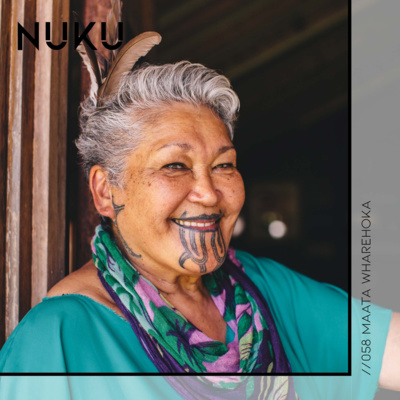
//058 Maata Wharehoka
Maata Wharehoka (Ngāti Tahinga, Ngāti Koata, Ngāti Apakura, Ngāti Toa, Ngāti Kuia) started her working life as a nurse. Her mahi in health saw her write the first stop smoking programme for Māori women and, she led wāhine in cervical screening programmes on marae.
She later found her niche in marae at Parihaka Pā and championed marae arts, raranga and karanga. In 2015 she won the Creative New Zealand Ngā Tohu ā Tā Kingi Ihaka award recognising her lifetime contribution to the arts. Maata’s many passions have been combined in her mahi around death, as she champions Kahu Whakatere Tupapaku, the tīkanga Māori practices surrounding death and burial.
In this episode she tells us about her life’s journey, what it was like to grow up with a strict mid-victorian minded aunty. She shares experiences of birth and death in her whānau, and she tells us why she advocates for euthanasia and how we all need to be prepared to die.

//057 Tuhi-Ao Bailey
Tuhi-Ao Bailey (Ngāti Mutunga, Te Ātiawa, Taranaki) is a kaitiaki dedicated to our Taiao. The Parihaka pā trustee supports hapū, marae and Māori landowners with water, fish and flora monitoring, as well as riparian planting and pest control. She is a passionate climate change champion and gardener who has helped set up maara and tree nurseries with a number of roopu, while also incorporating Indigenous planting practices into her own backyard.
She is known to many by her Pākehā ingoa, Emily. However in recent years she has actively sought to Indigenise her world even more, nurturing her reo Māori, receiving her moko kauae, and leading with her ingoa taketake.
In this episode we talk about her mahi as an iwi representative and her many years of advocacy, activism and action. We discuss the importance of whenua, growing kai and the effects of climate change. Tuhi Ao also shares an intimate insight into what it was like to be abruptly thrown into the public eye on October 15, 2007, and how Taranaki has helped heal her and find strength in her identity as a wahine Māori.

//056 Veranoa Hetet
Veranoa Hetet (Ngāti Tūwharetoa, Ngāti Maniapoto, Te Ātiawa) is a master weaver and one of our country’s most celebrated contemporary artists. Although, the humble wahine from Waiwhetū cringes when you describe her as that.
Veranoa is an uri of renowned weavers and teachers, her grandmother, the late Dame Rangimarie Hetet and her mother, the late Erenora Puketapu-Hetet. As well as her aunty, the late Diggeress Te Kanawa. She says being surrounded by art, and having parents as masters of their art, meant her journey was pretty straight forward.
Today, her work is national museum collections, it adorns the walls of galleries, she has kākahu that are awarded for excellence, like the New Zealander of the Year award, and most importantly, her work is worn and carried by her tamariki and mokopuna. Veranoa also helps whānau around the world to reclaim Māori art traditions through the Hetet School of Maori Art, an online kura where she teaches raranga, tāniko and kākahu, including korowai.
In this episode we talk about the importance of keeping our art practices alive, the beauty and vitality of the harakeke plant and we learn the correct kupu for our different woven cloaks.

//055 Laura O'Connell Rapira
Laura O’Connell Rapira (Te Ātiawa, Ngāruahine, Ngāpuhi, Te Rarawa, Ngāti Whakaue) is a community organiser, campaigner and writer.
She started her career organising events, before moving on to charity fundraising. However, she got pulled into a different direction when she started RockEnrol, a youth-powered campaign to get more young people out to vote. In 2014 she joined ActionStation and became their director. Since then, she has worked with communities nationwide around steps towards economic fairness, climate protection, human rights, global peace and honouring Te Tiriti o Waitangi.
In this episode we laugh about the irony of being full-time paid activist, we discuss some of her recent highlights, like the move to make Matariki a public holiday, and, we talk about her next chapter with the Foundation for Young Australians.

//054 Awatea Mita
Awatea Mita (Ngāti Pikiao, Ngāti Porou) is a justice advocate speaking out for equitable outcomes in the criminal justice system. She is also a passionate advocate for Indigenous rights.
Her current advocacy projects are around repealing the Bail Amendment Act 2013 and increasing the use of restorative practice alternatives to harm. Much of this drive came as a result of her own 22 month incarceration in 2015 and seeing first hand the vulnerability and strength of our wāhine Māori under punitive state control. She wants to help create a system that restores balance while keeping the mana and dignity of whānau intact.
In this episode we talk about her childhood and the integral part her whānau played in sharing the stories of resistance in Aotearoa. We discuss her experience in the prison system and how the death of her son, while she was incarcerated, changed her forever. Awatea also shares her current journey and the possibility of one day, lending her voice to represent our people in our highest office.